- Home
- Neal Shusterman
Darkness Creeping Page 8
Darkness Creeping Read online
Page 8
Dad had the music turned up full blast. It was his defense against Timmy and Maddie’s little war. Today it was about their stupid yellow blanket. There used to be twostupid yellow blankets, but last year one got lost. Ever since, the surviving one was fought over constantly.
“Mom, can’t you shut them up?” I asked.
Mom turned around and said something totally useless to the twins, like “You stop that now,” then she went back to looking out the window for garage-sale signs.
“Mom, I swear, if they don’t stop screaming, I’m going to gag them with that miserable blanket,” I warned.
“Have some patience, Marybeth,” Mom said, as she always says. “They’re only five; they’ll grow out of it.” That’s what she said when they were four, and when they were three, and when they were—
Two minutes later, Timmy bit Maddie, who then let loose a wail that rattled my brain. And that’s when I did it: I grabbed their stupid yellow blanket, balled it up, and hurled it out my window. We were driving over a bridge, and the blanket went sailing like a comet over the edge of the guardrail, down to the creek below.
Now they both began to cry hysterically, and Mom looked at me, horrified. “Marybeth, how could you do that? How could you be so cruel?”
I shrugged. “Maybe it’s genetic,” I said. Mom had yet to come up with a good comeback line to that one.
We continued on in a whimpering sort of silence until hand-painted signs led us into a neighborhood I didn’t know. We found the garage sale at the end of the street.
A man and woman had all the leftovers of their life spread out on their driveway. They smiled when they saw us coming. People who give garage sales love when people drive up in nice big vans like ours. Vans can haul off a lot, and often we did.
It used to be that we mostly picked things up for the church thrift shop. But ever since Dad lost his job, we’ve been picking up things for ourselves. Usually people just get rid of junk at these sales, but every once in a while you can find something great. That’s how we found my piano last month. It cost two hundred dollars, but the same one would have cost at least a thousand in a store.
But there were few such bargains at this garage sale.
“Most of the stuff we just pulled out of the attic,” said the pale, thin woman who owned the house. “We hadn’t been up there for years. It’s funny the things you collect.”
Yeah, I thought. It’s funny the things people try to get money for, too.
Mostly it was clothes—old bell-bottom pants, stained blouses, moldy things that smelled of mothballs, and children’s clothing. In fact, there were all kinds of children’s things—toys, picture books . . . and a child’s quilt.
The quilt was just draped there, over a little white rocking chair, and my eyes were immediately drawn to its lively colors. At first I thought it was because the sun was hitting it, shining through the trees, creating a patch of bright light that made the quilt seem to glow. But then I realized that the morning sun was still behind the clouds.
I stared, unable to take my eyes off the bright colors of the little blanket. How could someone have sewn something so beautiful? I wondered. And then I remembered how my grandmother used to sit hour after hour, working on patchwork quilts in tranquil silence. I’m not a sentimental type—things that are cute or quaint usually make me sick. But that quilt went beyond being quaint . . . it was masterful.
“Have your children grown and left home?” my mother asked the woman who lived there. “Is that why you’re selling all of this?”
The woman just stared at her, blinking. “No, we don’t have any children,” she said.
“So what’s the deal with all these toys?” I asked.
The woman shrugged uncomfortably. “I don’t know. They were all up in the attic.”
“They must have been left by the previous owners,” my mother suggested as she looked at the toys.
“Yes,” said the woman. “Yes, that must be it.” And then she went to help some other customers.
At the edge of the driveway, the twins bounced up and down on a plastic teeter-totter. But it wasn’t long before they began teasing each other, and Dad had to pull them apart before they tore each other to shreds.
By now, the quilt had caught Mom’s attention. “How beautiful,” she said, lifting it off that little white chair. She unfolded it, revealing swimming colors and hundreds of bright patches of fabric. Then she turned to the woman and held it up. “How much for this?” she asked.
“Five dollars,” the woman suggested.
“Sold,” Mom said. Then she turned to me. “Pay for it, Marybeth. I believe you owe the twins a replacement blanket.”
On Monday, during lunch, I sat with my friend Corinne in the cafeteria. We were scarfing down ravioli that was so salty, it made our eyes water.
“My little brother’s a nuisance, too,” Corinne said. “He gets into my things and makes paper airplanes out of my home-work. Then, when I yell at him about it, he cries, and I end up getting in trouble. Is that what it’s like with the twins?”
“It’s different with them,” I said. “It’s not that they get into my things, it’s just that they’re, well, there.”
“I wish my brother was just there,” said Corinne. “Actually . . . I wish he wasn’t.” And then she laughed, smiling with a ravioli-filled mouth as if she were just making a joke. But I knew she meant what she said, even if she didn’t know it . . . because lots of times I felt that way, too.
When I got home that day, as I was walking down the hallway toward my room, I thought I saw something move. It was something about the size of a cat—or maybe it was just my imagination. Still, I had to investigate.
Mom was off at work, Dad was at a job interview, and the twins were at day care, so I was totally alone. Maybe I should have been scared as I stepped into the twins’ room, looking for that moving shape, but I wasn’t. Not yet, anyway.
As my eyes scanned the room, I saw that the blinds were drawn, casting diagonal slits of light against the wall. I also noticed that the quilt, which had been folded at the end of Timmy’s bed when I left for school, wasn’t there anymore. And then I saw it.
There, in the corner of the room, something was peering out at me. It was a creature with a dark face and many legs, like a scorpion—at least that was what I thought before my brain kicked in. Then I realized it was just a trick of the light. I quickly fumbled with the blinds, and they rose with a clatter, letting in the late afternoon sun. That’s when I saw that there was no creature on the floor. It was just the quilt, crumpled into a random pile of hills and valleys that, when lit just right, seemed to be a living thing.
Still, I hesitated before I reached for it. Then I realized how silly I was being, so I grabbed it and shook it out to convince myself there was nothing hiding beneath it. Of course, nothing did shake out but a fine spray of dust that drifted in and out of the shafts of sunlight. I spread the quilt across Timmy’s bed, then stood back to admire the way the light was hitting it.
There was something about the quilt that I hadn’t noticed before. It wasn’t simply a random patchwork of designs—each square was a scene. I had to look at it for a long time to really see it, but once I did, I couldn’t deny that there were almost a hundred different scenes on that blanket. There was a winter scene of children playing in the snow, and a summer scene of children playing on the beach. Another square, which at first glance seemed to be just brown strips across a blue background, was actually someone crouching in the branches of a tree against a clear sky.
There were faces in the quilt, too, and after a while I began to feel the faces were all looking back at me. Suddenly it seemed there were a hundred people in the twins’ room—all of them staring at me—and I could swear those faces were opening their mouths, trying to tell me something. But there was only silence.
I backed away from the quilt until I hit a picture on the wall, and it fell down. I picked up the picture, and when I looked back at the quilt
, it was just a quilt again. No faces, just colorful fabric filling the many squares.
I left the twins’ room with a shudder and went into the living room, where the only faces looking at me were those in the smiling family photos on the wall. Then I sat at my piano and played something soothing. It had all been my imagination, I told myself. And I kept telling myself that until I almost believed it.
It was only a matter of time until Maddie and Timmy had a fight over the quilt. They had shared it for three whole days before they got tired of sharing. It was actually a record for them.
It began at dawn.
“It’s mine!” yelled Maddie.
“No, it’s mine!” screeched Timmy.
“No, it’s mine!”
“No, it’s MINE!”
“NO, IT’S MINE!”
It would have gone on like that for hours if someone didn’t stop them, so I scraped myself out of bed and went into their room.
“Will you two just SHUT UP!” I roared as Mom came into the room as well.
“Marybeth,” she said, “we don’t use the S-word in this house.”
I smirked at her. “That’s not the S-word,” I said.
“Yeah,” said Timmy. “‘Stupid’ is the S-word.”
“It’s MINE,” said Maddie, returning to the war at hand. “It’s for meto sleep with at night.” She wrapped herself in the quilt, but Timmy grabbed a corner and tugged until Maddie spun out of it like a top and hit the wall with a thud.
“I’ve got an idea,” I said, leaving the room and returning with thumbtacks. I pulled the quilt away from Timmy and tacked its four corners to the wall.
“Wonderful,” said my mother, smiling at me with approval. “It was too pretty to sit on a bed anyway.”
The twins began to whine about it, and that’s when I left for my own room, where I dressed and left for school as quickly as I could. All the while I was trying to push what I was thinking out of my mind. It was something I heard—not with my ears, but in a place deep within my head that my ears couldn’t reach.
It was coming from the quilt. The moment that I had driven those four thumbtacks through its corners, I had heard the quilt scream.
The next night Mom and Dad had a fight. Dad was doing his taxes and had papers spread across every table in the house. He always got irritable around tax time, but this year was worse than any other, because he had been out of work for so long.
He and Mom argued that night about money. They argued about how hard Dad was looking for work, and they argued that Mom didn’t get paid enough. They also argued over the fact that they were arguing. Finally I heard my name mentioned, and I stood at the edge of my doorway looking out into the living room, listening to what they were saying.
“We can’t have both,” said my dad. “It’s got to be one or the other.”
“We can’t just take it away from her,” said my mom. “She’s wanted one for so long.”
“Well, then, what are we going to do?” asked my dad in frustration. “Let the twins run around in the street after kindergarten?”
I knew what they were talking about. My piano. Ever since I was ten, they’d promised me I could have one, and just one month ago I finally got it. Now they were talking about selling it to pay for the twins’ day care.
I didn’t want to stand there and listen to their decision. I knew what it would be. The twins always got what they wanted. They were always taken care of first. And as for me, well, I would just have to share in Mom and Dad’s money misery, because misery loves company, right?
Then Mom and Dad began to whisper so quietly that I couldn’t hear, and I heard them coming into my room. I jumped onto my bed and pretended to read.
Mom, I could tell, almost had tears in her eyes. Dad looked pale and tired. This is all the twins’ fault, I thought. Dad had lost his last job because he had to spend so much time at home when they had the chicken pox.
“Your father and I are going out,” Mom said. “You’ll watch the twins for us, okay?” She didn’t so much ask me as tell me.
You must be desperate if you’re asking me, is what I wanted to say. They never trusted me alone with the twins, because they said I was too mean to them, and they’re probably right.
“Sure,” I said. “I’ll watch them.”
As soon as the twins heard that they were being left with me, they began to whine.
“No!” Timmy yelled. “Marybeth will play tricks on us!”
“She’ll play scary games,” Maddie cried. “She’ll make us cry. Marybeth hates us.”
“Don’t be silly,” Mom said. “Marybeth’s your sister. She loves you.” And with that, she and Dad left.
Now, I wouldn’t say I’m the nicest person in the world, but I would never call myself evil. At least not until that night. I’m not sure what came over me, but as soon as Mom and Dad left, I turned to the twins with a big smile that was not meant to comfort them.
“All right, you two,” I said. “Would you like to play a game?”
They looked at me with wide eyes that were getting wider by the second. “What kind of game?” they asked in unison.
“The monster game,” I replied.
“No!” they cried. “We hate the monster game! We hate it!”
“Well, tough,” I told them. “That’s the game I want to play.” Immediately the twins ran into the living room and ducked under the coffee table, as if hiding there would keep them safe.
“Please, Marybeth,” Timmy whimpered. “Please don’t scare us!”
I dug through my closet until I found this wonderfully hideous rubber Halloween mask. Then I put it over my face and stomped out into the living room.
“Grrrrrrowl!” I roared, shoving my monster face under the coffee table. The twins ran screaming into our parents’ room, and I stomped after them.
“I’m the monster that eats bad little boys and girls!” I growled, finding them in Mom and Dad’s bed, hiding their faces with pillows.
“Grrrrrrowl!” I roared again. They screamed, leaped out of the bed, and ran. I stomped after them and found them in their own room. They were fighting to get underneath the quilt, which now lay crumpled in the corner of Timmy’s bed, like a creature ready to spring.
That’s odd, I thought. Mom must have pulled it down from the wall.
They grabbed the quilt and managed to wrap both of themselves in it from head to toe. I began to laugh at the way they quivered beneath it. I mean, did they think that a puny little blanket could protect them?
“Are you scared?” I growled at them.
“Yes, yes, we’re scared.”
“Are you reallyscared?”
“Yes!” they yelled. “Please stop, Marybeth!”
“Good!” I bellowed. “That’s what you get for ruining everything for everyone.”
Then they started to cry, and I realized I had gone too far. I took the dumb old mask off. “Oh, stop whimpering,” I said. “It was just a game. You can come out now.”
But they didn’t come out.
“Come on,” I coaxed. “You can’t hide under that blanket all night!”
“We’re not hiding,” said Timmy. “We can’t get out!”
I watched as the two of them struggled to unravel themselves from the blanket.
“Don’t be ridiculous,” I said. But as I watched them struggle, I could see that blanket stretching around them, pulling tighter and tighter—actually straining to keep them from struggling out.
“Help us, Marybeth!” they cried. “The monster—it has us! It’s eating us!”
That’s when I saw the eyes. They were attached to all those faces—hundreds of them—all staring out of the quilt . . . and this time I knew it wasn’t just my imagination.
They were all the faces of children.
“Help us, Marybeth!” the twins kept shrieking.
Panicked, I ran across the room and, in the process, stepped on the thumbtacks that had held the thing to the wall. Wailing in pain, I fell to the gr
ound. That’s when I noticed that the twins’ cries seemed to be getting weaker. I hadto get them out.
I crawled to the bed, where the quilt had them wrapped up tighter than ever. I could see that, all bundled up, the thing did look like a creature . . . but like no creature I had ever imagined. I bit back my own fear, reached for the terrible quilt, grabbed hold of an edge, and tore it off the bed.
But there was nothing beneath it.
There in my hand was a mere blanket, a limp quilt that was still warm to the touch.
“No!” I cried.
I ran to my room with the horrible quilt clutched in my hand and got a pair of scissors. I was ready to cut the thing into a million pieces. But as I brought the scissors to the fabric I knew that I couldn’t do it—because of something I saw inside the quilt.
There, at the very corner of the fabric, was a new patchwork square. Two ovals of tan velvet on a purple cotton background. And, when I looked at it hard enough, those ovals became two faces—their faces. I could see my brother’s and my sister’s eyes, just like all the other eyes, silently staring out at me from inside the quilt.
The following Saturday, Mom and Dad had a garage sale.
“Look at this!” said a woman who rummaged through the piles of children’s clothes and children’s toys. “It’s a double stroller!” She was talking to her husband, who held newborn twins in his arms. “Just what we need,” the woman went on, and then she turned to my mother. “I guess your twins have outgrown it,” she said, giving the stroller a friendly pat.
My mother just stared at her, blinking. “No, we don’t have twins,” she said.
The woman glanced around at the piles of clothes. “But you seem to have two of everything, so I thought—”
“The stroller was in the garage,” my mother said with a shrug. “I don’t know how it got there . . . maybe it was from the previous owner.”

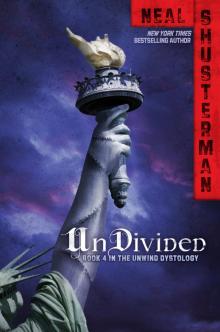 UnDivided
UnDivided UnBound
UnBound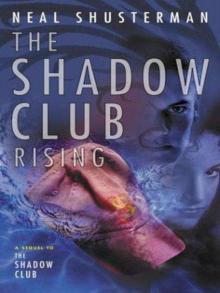 The Shadow Club Rising
The Shadow Club Rising Scorpion Shards
Scorpion Shards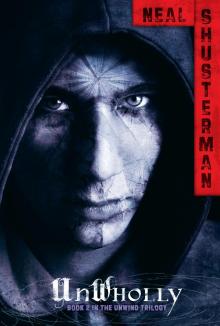 UnWholly
UnWholly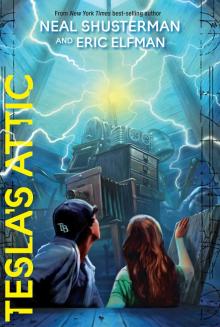 Tesla's Attic
Tesla's Attic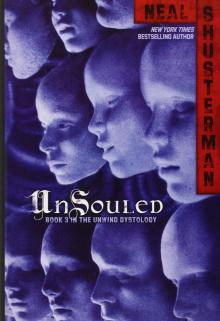 UnSouled
UnSouled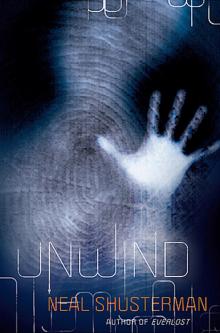 Unwind
Unwind Violent Ends
Violent Ends The Eyes of Kid Midas
The Eyes of Kid Midas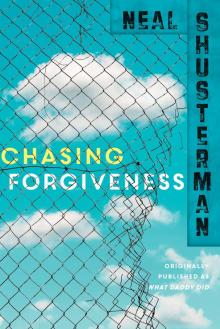 Chasing Forgiveness
Chasing Forgiveness Everfound
Everfound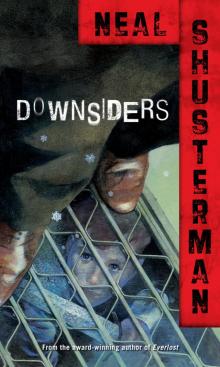 Downsiders
Downsiders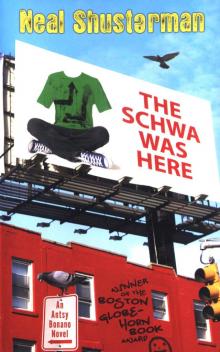 The Schwa Was Here
The Schwa Was Here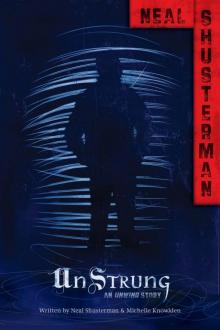 UnStrung
UnStrung Edison's Alley
Edison's Alley Duckling Ugly
Duckling Ugly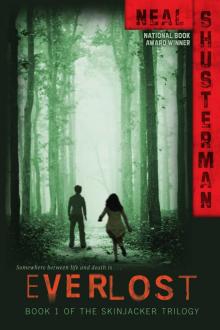 Everlost
Everlost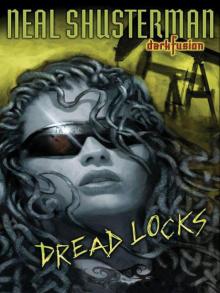 Dread Locks
Dread Locks Antsy Floats
Antsy Floats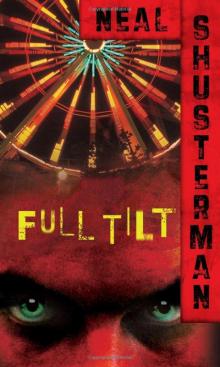 Full Tilt
Full Tilt Thunderhead
Thunderhead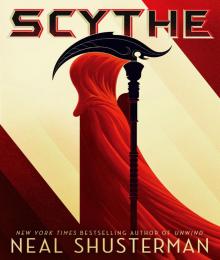 Scythe
Scythe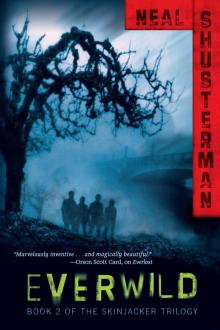 Everwild
Everwild Challenger Deep
Challenger Deep Shattered Sky
Shattered Sky Red Rider's Hood
Red Rider's Hood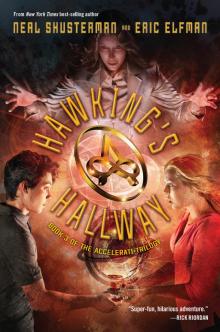 Hawking's Hallway
Hawking's Hallway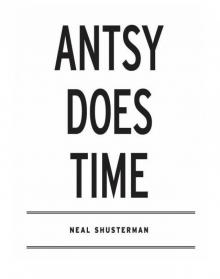 Antsy Does Time
Antsy Does Time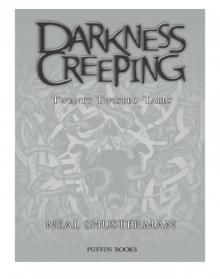 Darkness Creeping: Twenty Twisted Tales
Darkness Creeping: Twenty Twisted Tales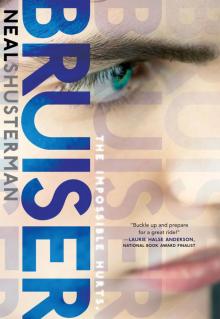 Bruiser
Bruiser Thief of Souls
Thief of Souls The Toll
The Toll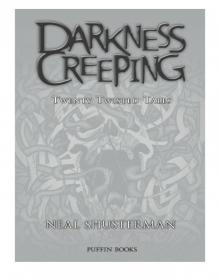 Darkness Creeping
Darkness Creeping Resurrection Bay
Resurrection Bay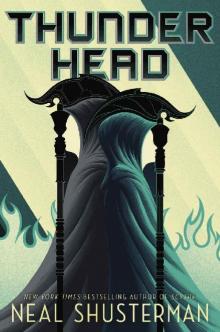 Thunderhead (Arc of a Scythe Book 2)
Thunderhead (Arc of a Scythe Book 2)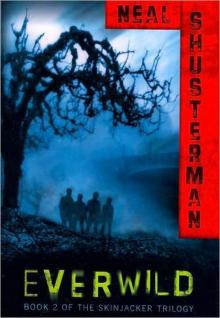 Everwild (The Skinjacker Trilogy)
Everwild (The Skinjacker Trilogy) Everfound s-3
Everfound s-3 Edison’s Alley
Edison’s Alley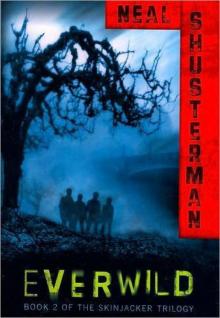 Everwild s-2
Everwild s-2 Dry
Dry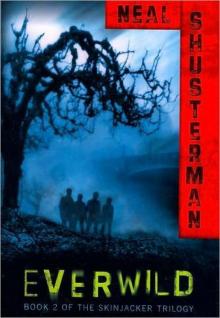 Skinjacker 02 Everwild
Skinjacker 02 Everwild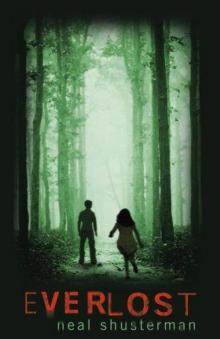 Everlost s-1
Everlost s-1